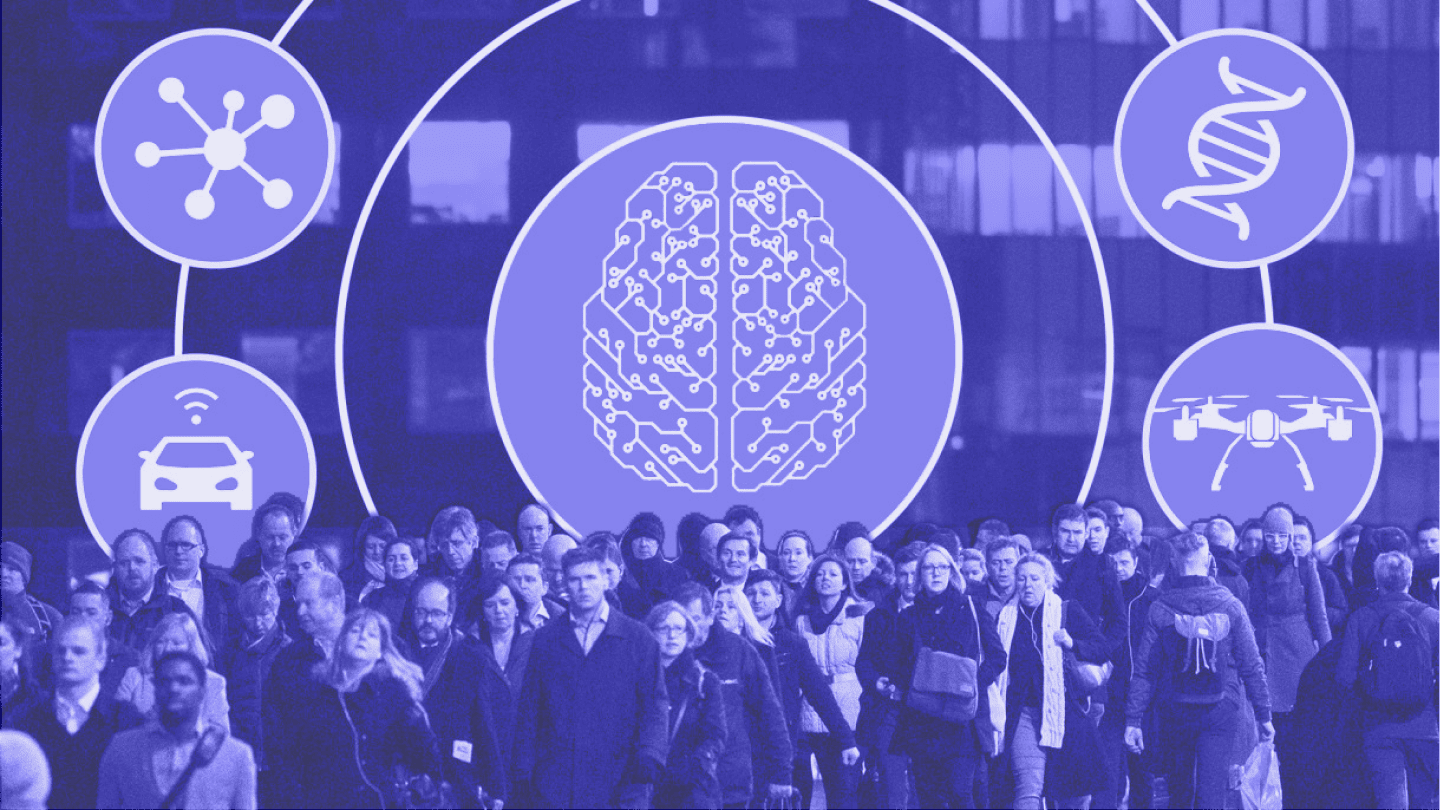AI mobile app development is seeing unprecedented growth. Artificial intelligence technology is reshaping our world. A mobile app development company that refuses to adopt AI will be left behind, while those that integrate AI into their processes will maintain a competitive edge. Why? More than 56% of customers want personalized recommendations and user experiences. And 92% of companies already use AI-based personalization to ensure customer satisfaction.
Let’s dive in to see how AI-powered tools can help in app development processes and how you can use them to stay ahead in your industry.
In this article:
The changing landscape: AI in mobile app development
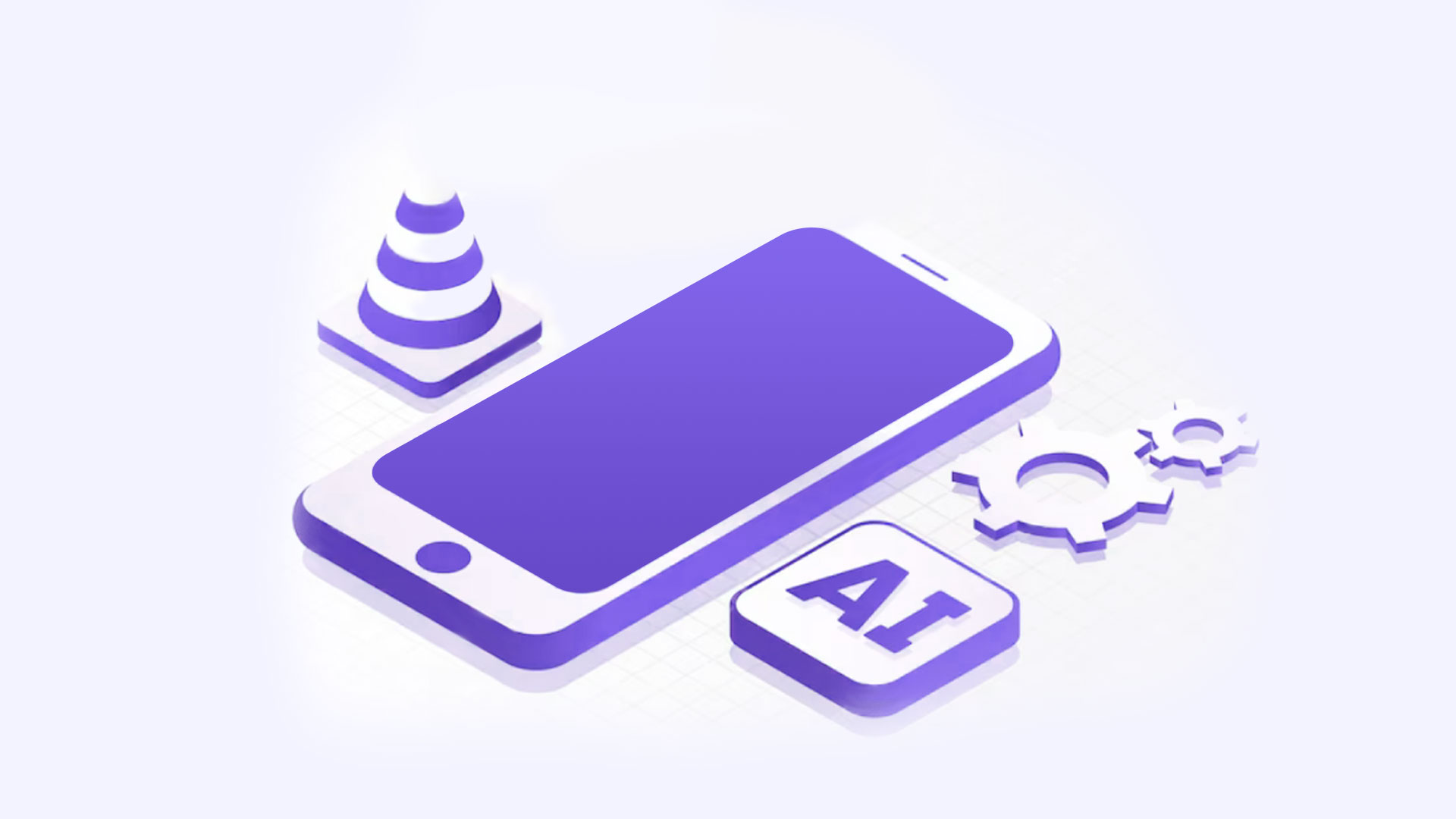
Regarding mobile app development, AI technology is reshaping the landscape. Other than offering personalized experiences, artificial intelligence and deep learning algorithms make developers more efficient. As repetitive application development tasks are done by AI, the app development team can take more of a creative and supervisory role. So, it’s no surprise that 81% of employees reported that AI tools improve their work performance.
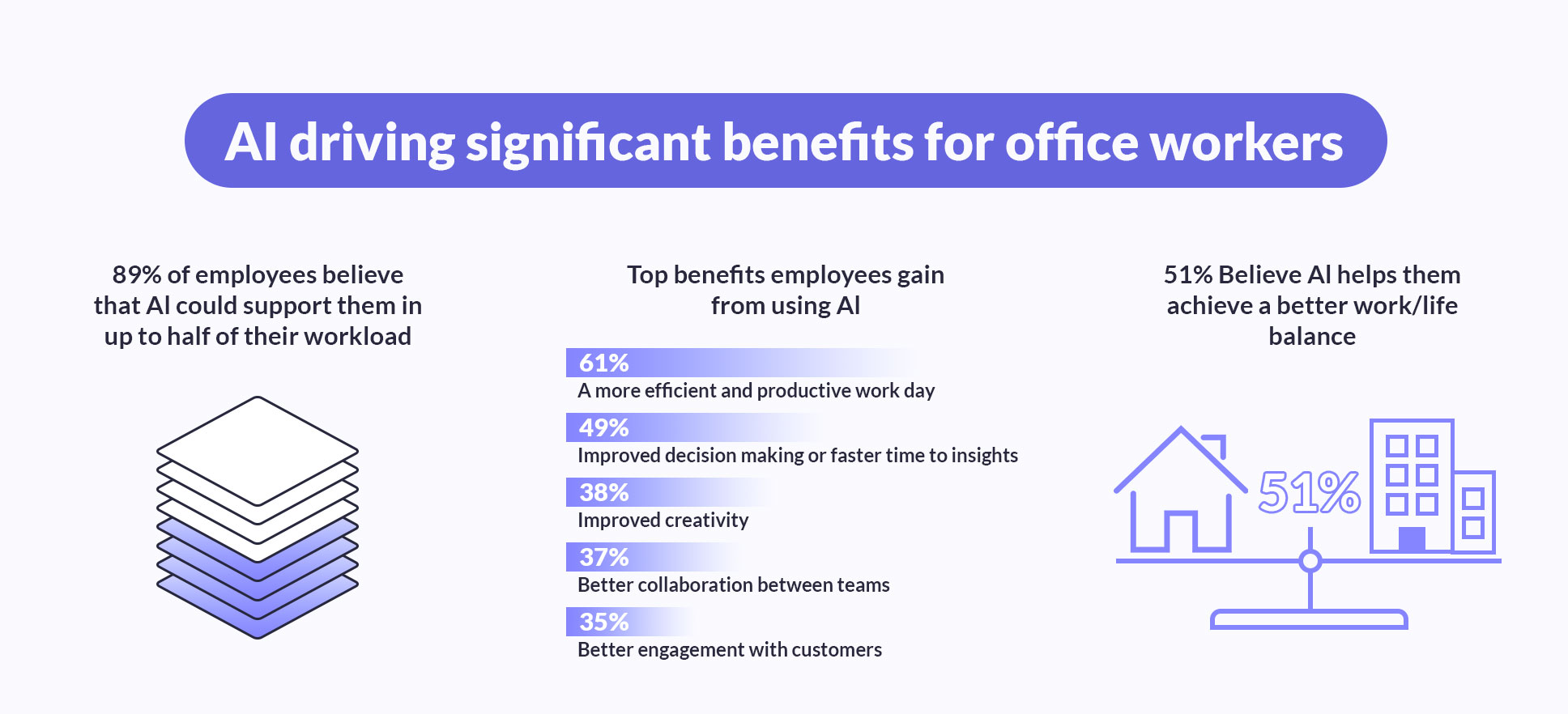
Let’s examine the impact of deep learning and AI in app development.
Impact of artificial intelligence on mobile applications
Artificial intelligence in mobile apps is rapidly changing the mobile app development industry. It’s affecting business processes and our understanding of software development. As Joe Kaeser, chairman of the supervisory board of Siemens Energy, stated, “Artificial intelligence is here and being rapidly commercialized, with new applications being created not just for manufacturing but also for energy, healthcare, and oil and gas. This will change how we all do business.”
We also see the evolving user expectations. Machine learning can predict user needs and human behavior, instantly offering personalized recommendations. While AI-based mobile apps can and do improve user experience, there is room for improvement.
Virtual assistants and chatbots are frustrating for some customers. For example, a study by Redpoint Global shows that 45% of users can’t grasp how AI technologies are used. The good news is that they also found that 73% of consumers believe AI can positively impact their experience.
Let’s see how businesses can benefit from machine learning and artificial intelligence in application development.
Let's create something extraordinary!
Turn your ideas into reality with our mobile development services, delivering a unique app that captures users' attention.
The role of AI in application development
What can an AI app development company get from using current technologies? And how does it work?
Artificial intelligence is the umbrella term for the different technologies that try to mimic human intelligence to solve complex tasks. Machine learning is a subfield of artificial intelligence that uses big data sets, statistical models, and algorithms to give you insights and drive informed decisions.
As AI tries to mimic human intelligence, today, we have machine learning algorithms known as neural networks (or artificial neural networks). These networks mimic how neurons connect in the human brain, and these networks have layers of nodes that communicate with each other. The more layers in neural networks, the ”deeper” the learning. Now, we have arrived at the term deep learning.
What does this mean for AI-powered mobile apps? Neural networks and deep learning are responsible for most progress with natural language processing, voice recognition, speech recognition, facial recognition, and image recognition. These AI-powered features lead to enhanced user experiences. That’s why you can ask Siri to find your favorite song and play it on max volume, and she will do it. And why Duolingo, the language learning app, will recognize and explain your mistakes and provide tailored exercises to improve your speech, vocabulary, writing, and grammar in a foreign language.
But enhanced user experiences are just some of the benefits you get when you implement AI in mobile apps. Your app development team will be thrilled to give repetitive tasks to AI and move faster through the software development cycles.
The benefits of AI in mobile app development
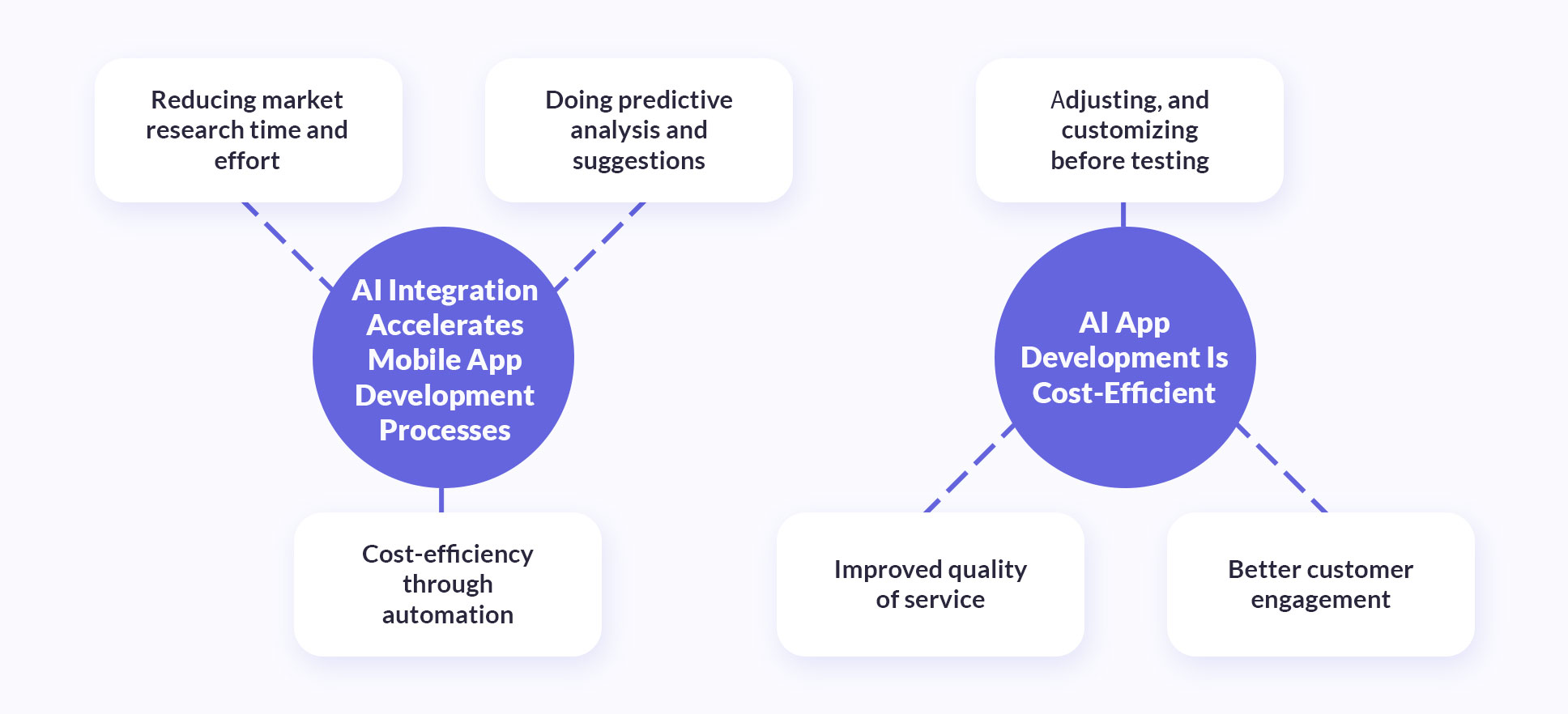
The mobile app development industry is evolving quickly, thanks to the advancements in artificial intelligence and machine learning. Natural language processing makes user engagement with mobile apps better. Many AI tools are also helping develop apps.
It can start with suggesting an app idea. Then, these tools use machine learning to predict user behavior and suggest features. Later, virtual assistants can improve customer engagement. What’s best, these AI tools even get to the nitty-gritty of solving software development problems and quirks, such as writing and testing code.


Thank you for Subscription!
AI integration can accelerate mobile app development processes
In mobile apps, AI implementation means automated processes and fewer human resources for application development.
Starting from the app idea, artificial intelligence (AI) can analyze the mobile app market and trends. Then, it can suggest to the app developers what type of app would best answer what the market is looking for. This can greatly reduce market research time and effort. The AI technology can do predictive analysis to identify and suggest the key features and functionalities of future mobile apps. Finally, by leveraging natural language processing, mobile app developers can task AI-powered tools with software development tasks, such as creating or suggesting lines of code for certain features.
When the code is written, app developers can check, adjust, and customize it before testing. AI-powered tools can also help in the testing phase. Using natural language processing capabilities, the developers can give AI apps a command in plain English to check the functionality of their mobile applications, as well as app performance.
Once mobile app development with AI is done and their AI-powered mobile application is market-ready, developers can rely on machine learning to ensure constant user engagement and satisfaction. How? The success of AI-enabled apps is based on AI technology constantly working in the background to track patterns and trends so that updates will improve user interactions with mobile applications.
Next, let’s see how AI development affects a company’s budget.

You may be interested
AI And Predictive Analytics: A Powerful Combination For Business Growth
Discover how this combination propels business growth in the ever-evolving landscape of data-driven decision-making.
Read the whole thingCost-efficiency of AI app development
AI-powered mobile applications take time and resources. While competent app developers are the main players in AI development, their jobs will be more focused on the app idea and key functionalities of their AI apps. The processes and tasks that can be automated will reduce the need for human intelligence, thus reducing labor costs.
AI-powered apps also have better quality of service than traditional apps. Implementing AI for mobile app development creates a structure that constantly improves thanks to machine learning and natural language processing. AI-powered mobile apps will learn what features the app user likes or dislikes and adapt accordingly.
Finally, using AI technology and voice recognition in chatbots and virtual assistants will bring customers instant and accurate answers to their inquiries. And, of course, businesses will reduce the cost of hiring customer service representatives.
AI-powered mobile app development: challenges and concerns
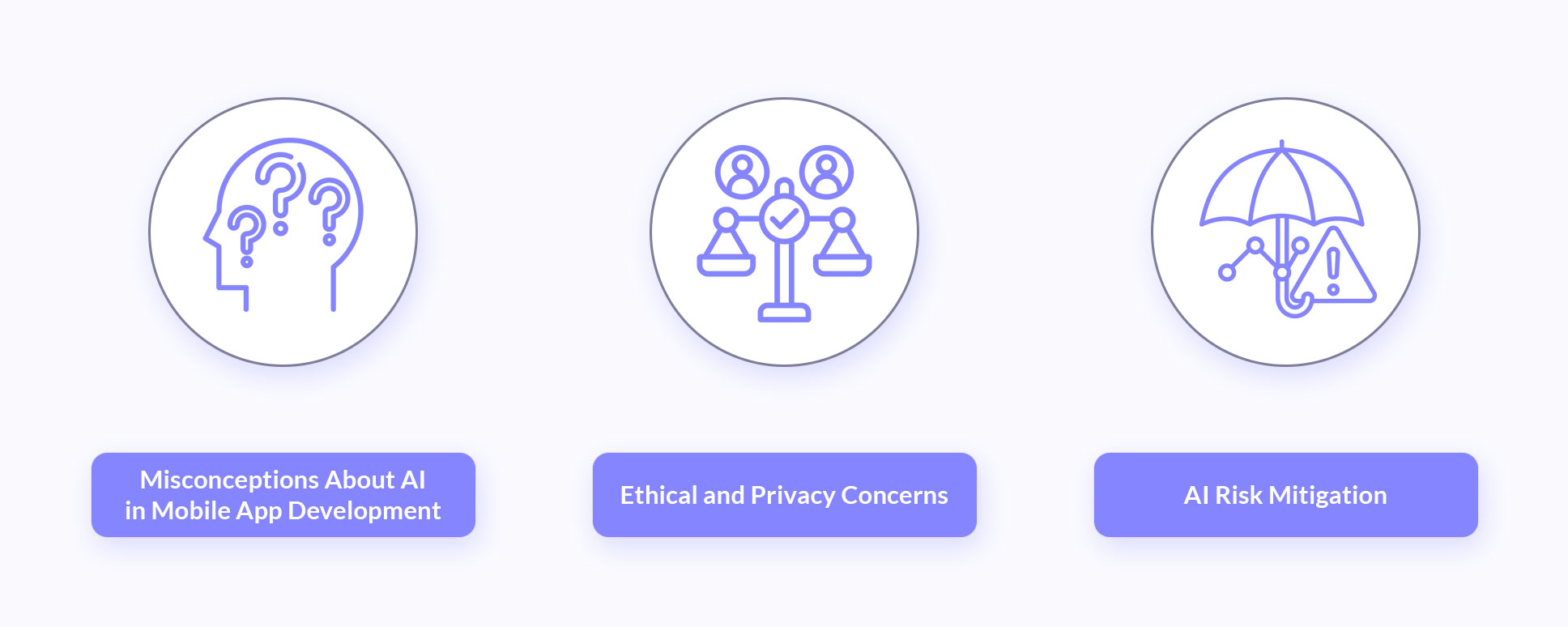
The advances in AI development and the rise of AI-powered mobile apps have brought many concerns. Aside from the common questions of bias, reliability, and security, there are also more tangible questions for companies that want to begin AI app development.
Misconceptions about AI in development
You may have heard that using AI in mobile app creation costs a lot of money. This may be true for some large corporations. However, the cost savings in manpower and the potential returns will be worth the investment in intelligent applications. In fact, Accenture research shows that some companies are already seeing a triple return on their AI investment.
Another common misconception is that artificial intelligence will cost app developers their jobs. While some entry-level programming jobs will seize, full-blown application development will still require human creativity and oversight.
Ethical and privacy concerns
The main ethical and privacy concerns surrounding AI-powered apps include:
- Access to users’ private information
- Cybertheft and cyberbullying
- Bias and discrimination
As artificial intelligence continues to evolve, however, we are seeing potential solutions on the horizon.
AI risk mitigation
With the serious concerns surrounding artificial intelligence, some businesses entrust a competent AI app development company to help mitigate these risks.
Some of the strategies for risk mitigation in application development include:
- Rigorous testing
- Human oversight
- Transparency and accountability
- Implementing AI regulations and safety standards
If you need help creating mobile apps and want to reap the benefits of sophisticated, efficient, and systematic AI app development, our dedicated team at Geniusee can help.
Our six-step AI app development process starts with understanding your objectives and goes through design, testing, and deployment to provide ongoing support and updates. We will be there each step of the way to help your business succeed.
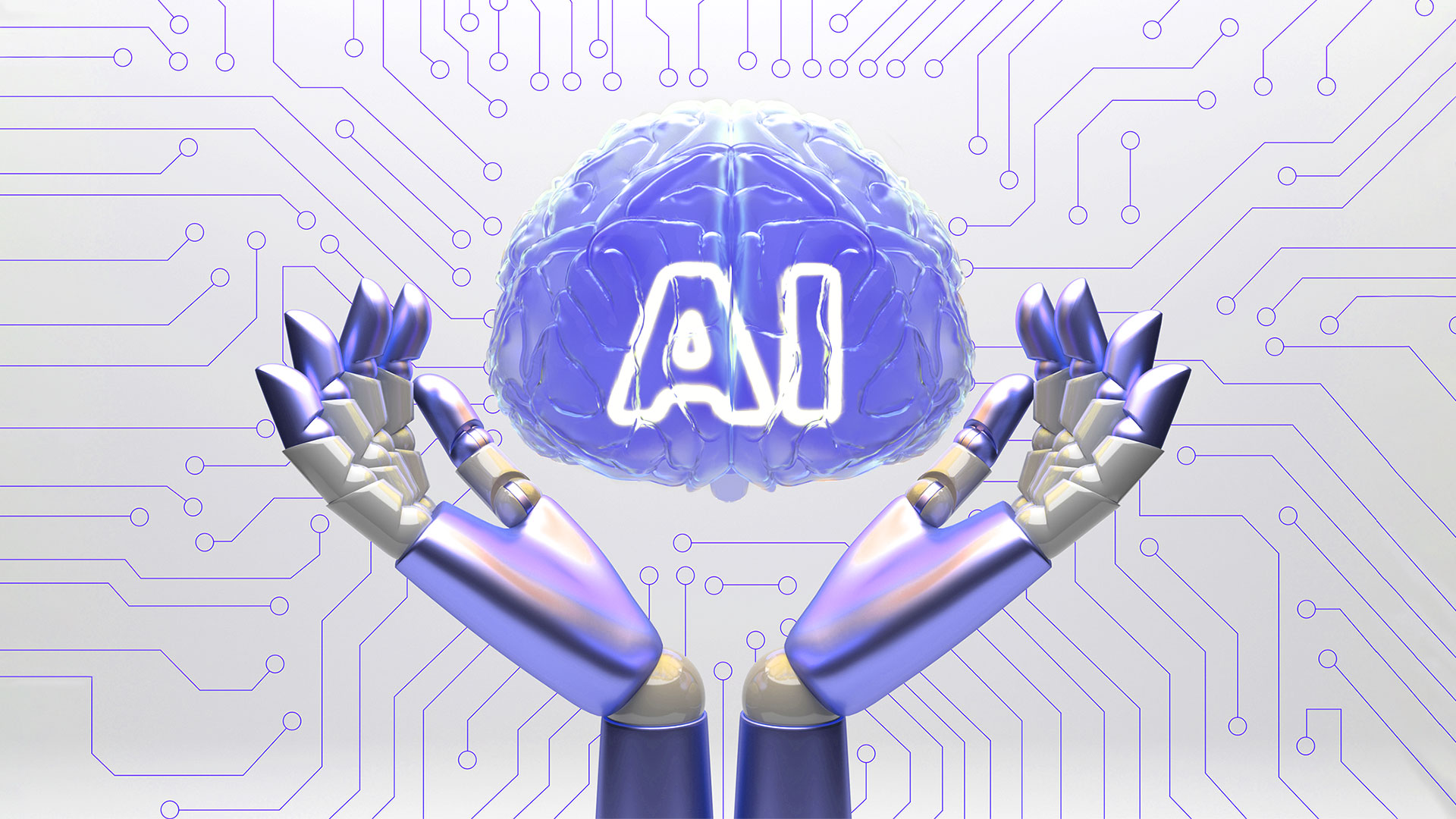
More on the topic
AI In SaaS: Using AI-Augmented Development To Fuel Growth
Uncover the strategic impact of AI-augmented development, driving growth and innovation in the SaaS landscape.
ExploreThe future of AI in mobile app development
Artificial intelligence entered the world of mobile app development with a bang, and it’s here to stay. What started with speech recognition technology continues to evolve with advancements in machine learning, and it will continue to reshape AI app development for years.
The two major emerging trends and technologies in mobile app development include:
Federated learning — machine learning models that increase data privacy
Edge computing — distributed information technology that speeds up data processing and saves bandwidth
Conclusion
As artificial intelligence continues to evolve, it’s brought considerable benefits to mobile app development. Using AI in mobile apps may be necessary to gain and keep a competitive edge in today’s fast-paced environment with the ever-shifting demands of modern users.



